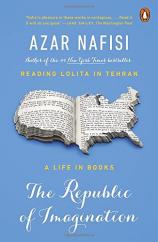Reading Group Guide
Discussion Questions
The Republic of Imagination: America in Three Books

1. What does Azar Nafisi understand best about America? In your view, is there anything that she misunderstands? Discuss you answer.
2. In the first paragraph of her introduction, Nafisi offers the assertion (through someone else’s voice) that Americans “don’t care about books and such things” (p. 1). Do you agree? If so, why do you think this is the case, and what can or should be done to change it?
3. What are Nafisi’s thoughts on the idea of “home”? How does she express these ideas in her discussion of her three books?
4. Nafisi quotes Carson McCullers for the proposition that “Americans are the loneliest [people] of all” (p. 29). Is she right? If so, what makes us so lonely? How might your answer to this question differ from one that Nafisi might give?
5. Nafisi fantasizes about organizing a march on Washington to proclaim her “Republic of Imagination” (p. 27). What might this march look like? Would you consider joining it? Why or why not?
6. Echoing the judgment of Ernest Hemingway, Nafisi regards THE ADVENTURES OF HUCKLEBERRY FINN as the ancestor of all subsequent American fiction. What arguments does she offer to establish Twain’s novel as the quintessential, inescapable American story? Does she persuade you?
7. Nafisi writes, “The United States is a country founded as much on broken dreams as it is on hope and promise” (p. 115). She offers both THE ADVENTURES OF HUCKLEBERRY FINN and the life of her friend Farah in support of her assertion. Is America unique in its dual capacity for hope and tragedy? Discuss your answer.
8. In her section on THE ADVENTURES OF HUCKLEBERRY FINN, Nafisi also narrates her own story of becoming an American citizen (pp. 111-115). What reflections on the subjects of identity, both personal and national, does this decision lead her to? What, if anything, is Nafisi able to perceive about America that a lifelong citizen might not see as readily? In your view, does her becoming a citizen give her more of a right to criticize America than if she remained legally Iranian?
9. Nafisi regards Huck as an archetype of the “successful failure” (p. 141). The financially secure but morally cornered George F. Babbitt might contrastingly be seen as a failed success. To succeed morally like Huck, must one fail by worldly measures, and vice versa? Why do at least some people, Nafisi included, seem to regard this as the great, inevitable American trade-off?
10. What is Nafisi’s concept of the ideal education? How is that ideal ignored and disserved by David Coleman’s Common Core?
11. Nafisi asks, “Are we all becoming Babbitts now?” (p. 169) Well, are we? What does it mean to be a Babbitt? How does a person become one, and why does Nafisi see such a transformation as a fate worse than death?
12. Nafisi quotes from THE HEART IS A LONELY HUNTER, “The most fatal thing a man can do is try to stand alone” (p. 262). But isn’t America somehow about standing on one’s own? And if so, is there a fatal quality woven into our national identity? (In answering this question, you may wish to consider the connection that Nafisi suggests between American loneliness and our endless epidemic of mass shootings (p. 278).)
13. Nafisi sees a parallel between the quiet desperation of McCullers’s characters and America’s current malaise. Yet McCullers’s book was set in the Great Depression, whereas, despite the crash of our economy of 2008, contemporary America still looks and feels, for the most part, like an affluent society. Has America changed more than Nafisi recognizes or are our current discontents part of the same narrative?
14. Nafisi’s epilogue is chiefly concerned with the life and writing of James Baldwin. What, according to Nafisi, does Baldwin have to teach us about the leap of faith that is known as being an American?
The Republic of Imagination: America in Three Books
- Publication Date: September 1, 2015
- Genres: Literary Criticism, Memoir, Nonfiction
- Paperback: 352 pages
- Publisher: Penguin Books
- ISBN-10: 0143127780
- ISBN-13: 9780143127789








